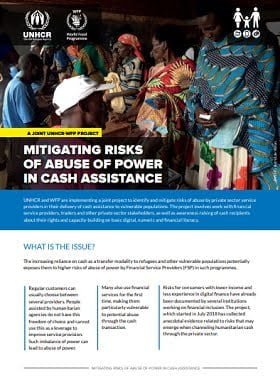Mitigating risks of abuse of power in cash and voucher assistance
Since July 2018, UNHCR and WFP are jointly identifying and mitigating risks of abuse of power by private sector service providers in the delivery of cash assistance to vulnerable populations. The project involves work with financial service providers (FSPs), traders and national regulators, as well as awareness raising of cash recipients about their rights and capacity building on financial literacy.
The issue
Regular customers can usually choose between several financial service providers. People assisted by humanitarian agencies do not have this freedom of choice and cannot use this as a leverage to improve service provision. Such imbalance of power can lead to abuse of power. Many also use financial services for the first time, making them particularly vulnerable to potential abuse through the cash transaction.
Risks identified so far range from private sector agents charging additional fees, inappropriate behavior, issues around PIN and other data confidentiality, weak national regulation and the lack of understanding around the cash assistance process and delivery mechanisms, amongst others.
Project objectives
- Promoting appropriate behaviour by FSP agents and traders in the delivery of cash assistance by incentivizing good behaviour and developing practical training materials;
- Ensuring UNHCR/WFP contracts with FSPs appropriately reflect the FSP responsibility (and that of traders and other service providers) to prevent and follow up abuse cases by collaborating with national regulators to influence a favourable regulatory environment and developing standard contract clauses and codes of conduct;
- Increasing awareness of cash recipients on their consumer rights vis-à-vis FSP field agents, and build their capacity in basic financial and digital literacy through innovative learning channels and communication approaches.
Through a collaborative approach and joint engagement of WFP and UNHCR in-country teams, the initiative achieves additional impact by bringing together key stakeholders at decision-making levels across humanitarian agencies, the private and public sector.
The project ultimately aims to ensure that recipients of cash assistance feel protected and empowered as real clients of FSPs, with financial services extending beyond enabling the mere receipt of assistance.
The project will develop a toolkit mitigating risks of abuse of power, which will be of use for the broader humanitarian community, FSPs and national regulators. Lessons learned from partaking countries are being mainstreamed across WFP guidance, tools and legal documents.
Animation for financial service providers: Good client relations, code of conduct and fair treatment.
Animation for cash recipients: Client rights and expectations in cash assistance.
Translations of the animation for financial service providers
French: Vidéo pour les fournisseurs de services financiers: Bonnes relations avec les clients, code de conduite et traitement équitable.
Spanish: Video animado para provedores de servicios financieros
Video for financial service providers in Arabic
The content on this webpage has been developed by UNHCR and WFP does not necessarily reflect the views of the CALP Network.
More resources

Mitigating Risks of Abuse of Power in Cash Assistance in Uganda
Report
This document outlines lessons learned from a joint UNHCR/WFP project in Uganda with the aim to identify and mitigate the risks of abuse of power in cash assistance through the main delivery mechanisms used in-country: mobile money, e-cards and cash delivered through mobile vans.

Mitigating Risks of Abuse of Power in Cash Assistance – 4 pages
Report
UNHCR and WFP are implementing a joint project to identify and mitigate risks of abuse by private sector service providers in their delivery of cash assistance to vulnerable populations. The project involves work with financial service providers, traders and other private sector stakeholders, as well as awareness raising of cash recipients about their rights and capacity-building on basic...

Mitigating Risks of Abuse of Power in Cash Assistance in Afghanistan
Report
This document outlines lessons learned from a joint UNHCR-WFP project in Afghanistan aimed at identifying and mitigating the risks of abuse of power in cash assistance. The cash transfer mechanisms discussed during the mission were cash distribution through Hawalas, mobile token, mobile e-vouchers and bank cheques.

Mitigating Risks of Abuse of Power in Cash Assistance in Rwanda
Report
This document outlines lessons learned from a joint UNHCR-WFP project in Rwanda aimed at identifying and mitigating the risks of imbalance of power in cash assistance. The cash transfer mechanism reviewed during the project was a bank card, proposed to the overwhelming majority of refugees receiving cash assistance.

Mitigating Risks of Abuse of Power in Cash Assistance in Iraq
Report
This document outlines lessons learned from a joint UNHCR/WFP project in Iraq aimed at identifying and mitigating the risks of abuse of power in cash assistance. The cash transfer mechanisms reviewed during the
project include mobile money, e-vouchers and cash delivered through money transfer agents.

Mitigating Risks of Abuse of Power in Cash Assistance – Workshop Nairobi, Kenya
Report
UNHCR and WFP are implementing a joint project to identify and mitigate risks of abuse of power by private sector service providers in the delivery
of cash assistance to vulnerable populations. The workshop, held in Nairobi on 10-11 December 2018, followed visits to the first two pilot countries, Democratic Republic of the Congo (DRC) and Cameroon. It aimed to build further on initial...

Mitigating Risks of Abuse of Power in Cash Assistance in Cameroon
Report
This document outlines lessons learned from a joint UNHCR/WFP project in Cameroon with the aim to, with Financial Service Providers (FSPs), identify and mitigate the risks of abuse of power in cash assistance, including through mobile money, e-vouchers and cash in hand.

Mitigating Risks of Abuse of Power in the Democratic Republic of Congo
Case Study
This document outlines lessons learned from a joint UNHCR/WFP project in the Democratic Republic of Congo (DRC) with the aim to, with Financial Service Providers (FSPs), identify and mitigate the risks of abuse of power in cash assistance, including through cash in hand, pre-paid cards and mobile money.


